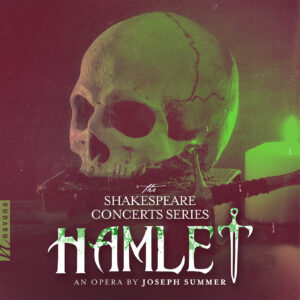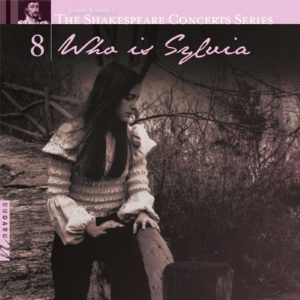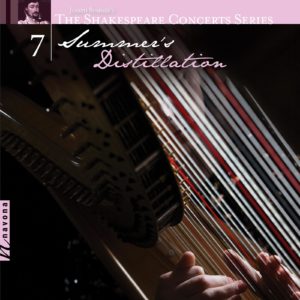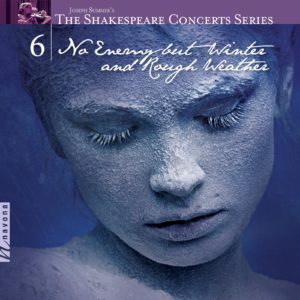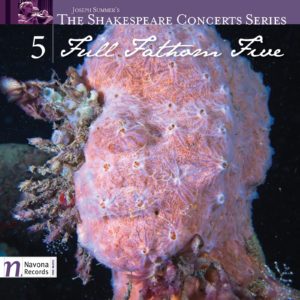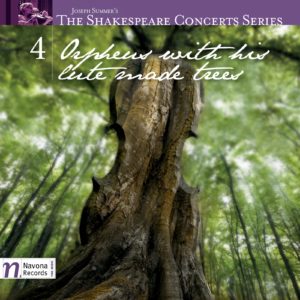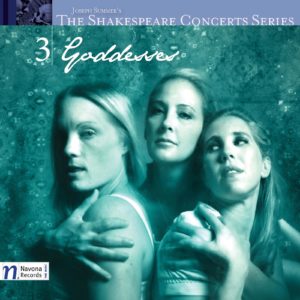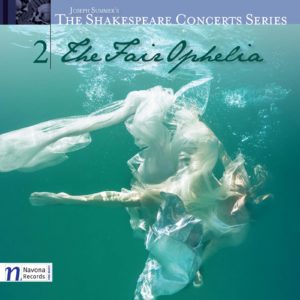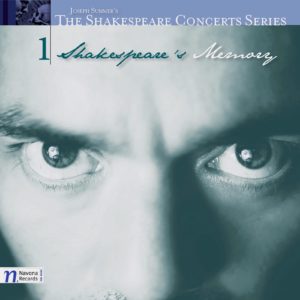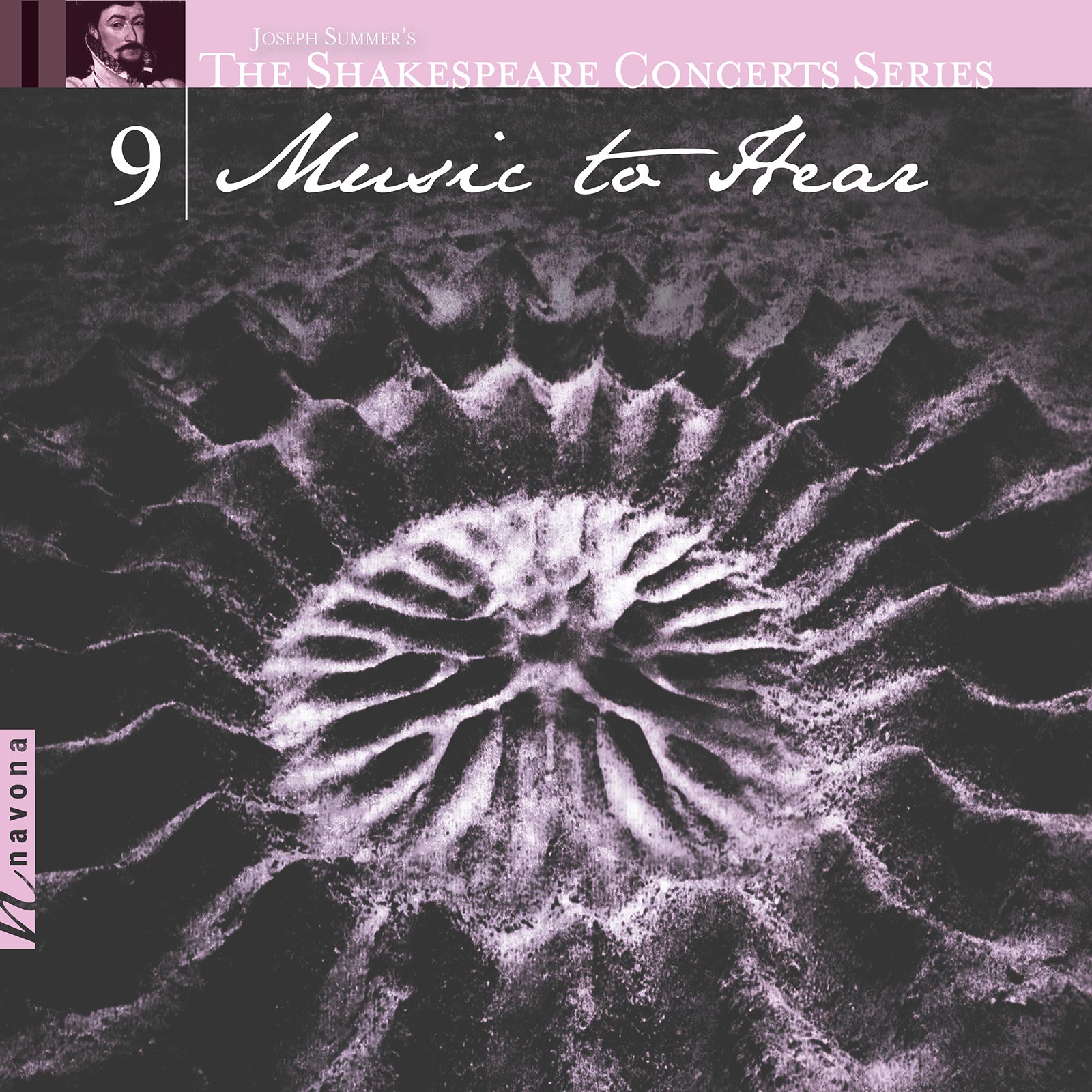
Share Album:
Music to Hear
Joseph Summer composer
MUSIC TO HEAR, Joseph Summer’s follow up to WHO IS SYLVIA from Navona Records off his Shakespeare Concerts set, is the result of the composer’s lifelong obsession with poetry. The album pairs the works of contemporary poets as well as Shakespeare with Summer’s music in order to express deeper significance than either words or music are capable of on their own.
The first two tracks on the record—both for string quartet with a female vocalist—set sonnets by the eminent poet Robert Kelly. They blossomed out of Summer’s friendship with Kelly; in return for Kelly having written a poem about Summer’s music, Summer set the poet’s “Sonnet 4, for Lydia” for mezzo soprano and string quartet as well as “Spring Sonnet” for soprano and quartet. These contemporary verses are paired Shakespeare’s “Sonnet 8” which cries out “Music to hear, why hear’st thou music sadly?” Later comes Boston composer Tom Schnauber’s world-premiere setting of Wordsworth’s “Scorn Not the Sonnet” for mezzo-soprano and piano.
After two more settings of Shakespeare, we hear composer Binna Kim give life to Lady Macbeth’s “Give Me Your Hand.” The piece for mezzo-soprano, cello, and piano is chillingly evocative, portraying Lady Macbeth’s descent into madness in the wake of the murders she helped perpetrate. Summer’s settings of Sonnets 97 & 98 follow, whose rich string textures are full of love and agonized longing. The work ends with Summer’s original “Epilogue to the Tempest,”—Andy Papas’s imposing baritone providing a satisfying finale to the album.
The marriage of music and poetry is both ancient and elemental. In his musical settings, Summer plums a region of the human soul rarely exposed in the bustle of daily life. In MUSIC TO HEAR, Summer invites listeners to claim this deeper humanity, just as Shakespeare did at the Globe Theatre some 400 years earlier.
This release features the award-winning Ulysses Quartet, in residence at the Juilliard School of Music.
Listen
Stream/Buy
Choose your platform
Track Listing & Credits
| # | Title | Composer | Performer | |
|---|---|---|---|---|
| 1 | Sonnet 4 "For Lydia" | Joseph Summer | Vera Savage, mezzo-soprano; Ulysses Quartet | Christina Bouey, violin 1; Rhiannon Banerdt, violin 2; Colin Brookes, viola; Grace Ho, cello | 7:03 |
| 2 | Spring Sonnet | Joseph Summer | Andrea Chenoweth, soprano; Ulysses Quartet | Christina Bouey, violin 1; Rhiannon Banerdt, violin 2; Colin Brookes, viola; Grace Ho, cello | 3:55 |
| 3 | Sonnet 8 | Joseph Summer | Kathryn Guthrie,soprano; Thea Lobo, mezzo-soprano; SangYoung Kim, piano | 7:10 |
| 4 | Sonnet 110 | Joseph Summer | Andy Papas, baritone; Ulysses Quartet | Christina Bouey, violin 1; Rhiannon Banerdt, violin 2; Colin Brookes, viola; Grace Ho, cello | 3:38 |
| 5 | Sonnet 144 | Joseph Summer | Brianna Robinson, soprano; Vera Savage, mezzo-soprano; Omar Najmi, tenor; Ulysses Quartet | Christina Bouey, violin 1; Rhiannon Banerdt, violin 2; Colin Brookes, viola; Grace Ho, cello | 5:32 |
| 6 | Sonnet 51 | Joseph Summer | Ryu-Kyung Kim, mezzo-soprano; SangYoung Kim, piano | 4:04 |
| 7 | Scorn Not the Sonnet | Thomas Schnauber | Ryu-Kyung Kim, mezzo-soprano; SangYoung Kim, piano | 4:46 |
| 8 | Cannikin Clink | Thomas Schnauber | Ryu-Kyung Kim, mezzo-soprano; Hyun-ji Kwon, cello | 3:44 |
| 9 | Sisters Weird | Thomas Schnauber | Andrea Chenoweth, soprano; Julia Cavallaro, mezzo-soprano; Ethan Bremner, tenor; Ulysses Quartet | Christina Bouey, violin 1; Rhiannon Banerdt violin 2; Colin Brookes, viola; Grace Ho, cello | 7:27 |
| 10 | A Wren | Howard Frazin | Ryu-Kyung Kim, mezzo-soprano; Hyun-ji Kwon, cello | 2:50 |
| 11 | Give Me Your Hand | Binna Kim | Ryu-Kyung Kim, mezzo-soprano; SangYoung Kim, piano; Hyun-ji Kwon, cello | 9:47 |
| 12 | Sonnets 97 & 98 | Joseph Summer | Brianna Robinson, soprano; Omar Najmi, tenor; Ulysses Quartet | Christina Bouey, violin 1; Rhiannon Banerdt violin 2; Colin Brookes, viola; Grace Ho, cello | 9:40 |
| 13 | Epilogue to the Tempest | Joseph Summer | Andy Papas, baritone; Ulysses Quartet | Christina Bouey, violin 1; Rhiannon Banerdt, violin 2; Colin Brookes, viola; Grace Ho, cello; Miroslav Sekera, piano | 5:45 |
Sonnet 4 "For Lydia"
Text by Robert Kelly
Spring Sonnet
Text by Robert Kelly
Sonnet 8
Text by William Shakespeare
Sonnet 110
Text by William Shakespeare
Sonnet 144
Text by William Shakespeare
Sonnet 51
Text by William Shakespeare
Scorn not the Sonnet
Text by William Wordsworth
Cannikin Clink
Text by William Shakespeare; from Othello (II, 3)
Sisters Weird
Text by William Shakespeare; from Macbeth (IV, 1)
A Wren
Text by Denise Levertov
Give Me Your Hand
Text by William Shakespeare; from Macbeth (IV, 1)
Sonnets 97 & 98
Text by William Shakespeare
Epilogue to the Tempest
Text by William Shakespeare; from The Tempest
All Tracks recorded September 30, 2015, April 29-30, 2018, April 8-9 and October 1, 2019 at Mechanics Hall in Worcester MA
Producer Joseph Summer
Recording Engineer Joseph Chilorio
Music Directors:
Brett Hodgdon (1, 5, 12)
Tim Ribchester (2, 4, 6-11, 13)
Joseph Summer (4)
Executive Producer Bob Lord
Executive A&R Sam Renshaw
A&R Director Brandon MacNeil
VP, Audio Production Jeff LeRoy
Audio Director Lucas Paquette
Mastering Shaun Michaud
VP, Design & Marketing Brett Picknell
Art Director Ryan Harrison
Design Edward A. Fleming
Publicity Patrick Niland, Sara Warner
Artist Information
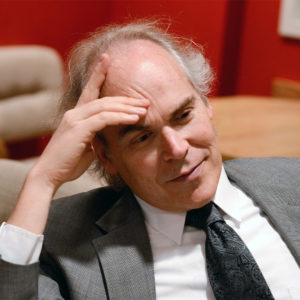
Joseph Summer
Joseph Summer began playing French horn at the age of 7. While attending the Eastern Music Festival in North Carolina at age 14 he studied composition with the eminent Czech composer Karel Husa. At age 15 he was accepted at Oberlin Conservatory, studied with Richard Hoffmann, Schönberg’s amanuensis, and graduated with a B.M. in Music Composition in 1976. Recruited by Robert Page, Dean of the Music Department at Carnegie Mellon University, Summer taught music theory at CMU before leaving to pursue composition full time.
Rhiannon Banerdt
Violinist Rhiannon Banerdt made her solo debut at age 14 with the New England Symphonic Ensemble in Johannesburg, South Africa. She has since made solo and chamber music appearances at Philadelphia's Kimmel Center, New York's Weill Hall at Carnegie, and Boston's Jordan Hall, among others, with performances hailed by Edith Eisler of Strings Magazine as “real music-making–concentrated and deeply felt.”
Christina Bouey
Canadian violinist, Christina Bouey, is hailed by the New York Times for playing “beautifully,” by the New York Post, “When violinist Christina Bouey spun out that shimmering tune, I thought I died and went to heaven,” and by Opera News, for playing “with exquisite, quivering beauty.”
Ethan Bremner
Since his arrival in Boston, Ethan Bremner has become one of the city’s most sought-after tenors. He made his local debut with Boston Opera Collaborative in 2006 as Achilles in Gluck’s Iphigenie en Aulide, and then sang with the company as Rodolfo in Puccini’s La Bohème.
Thea Lobo
Hailed as "excellent", "impeccable", "limpidly beautiful", "impressive", "stunning", and "Boston's best", Grammy-nominated mezzo-soprano Thea Lobo's recent appearances include concerts with The Peregrine Consort, The Northwest Florida Symphony Orchestra, The Spectrum Singers, Great Music in a Great Space Series, MassOpera, USF New Music Festival, True Concord, The Sarasota-Manatee Bach Festival, Classical Revolution St. Petersburg, EnsembleNewSrq, and many more.
Colin Brookes
Praised as a “master of the strong lines”, concert violist Colin Brookes is a native of Pittsburgh PA, where he made his solo debut with the Pittsburgh Symphony at the age of 17. A founding member of the award-winning Ulysses Quartet, Brookes has taught in the Pre-College Division of the Juilliard School, and the undergraduate programs of Yale University and SUNY Stony Brook.
Julia Soojin Cavallaro
Julia Soojin Cavallaro, mezzo-soprano, enjoys a richly varied career in opera, oratorio, recital, and chamber music. Critics have praised her “round, chocolaty tone” (Boston Classical Review) and her “warm mezzo, perfect diction, and easy phrasing” (New York Classical Review).
Andrea Chenoweth
Andrea Chenoweth, soprano, is a two-time regional finalist in the Metropolitan Opera National Council auditions. She has appeared with orchestras and opera companies throughout the United States, including regular appearances with the Cleveland Orchestra, the Dayton Philharmonic Orchestra, Cleveland Opera, and Dayton Opera.
Howard Frazin
The Dallas Morning News praised composer Howard Frazin’s piano trio as “genuinely touching,” and the Boston Globe described his ISAAC oratorio as “clear in design and Brittenesque in texture [with an] almost unbearable poignancy.”
Robert Kelly
Poet Robert Kelly, raised on the south shore of Long Island, has been studying language all his life, which led him into writing. He has been teaching at Bard College since 1961, the year his first book, Armed Descent, was published.
Binna Kim
Binna Kim is a composer from Seoul, Korea. Her inspirations come from various forms of art. Recently, she has been influenced immensely by installation art from artists such as Lee Ufan, Sarah Sze, and Doris Salcedo.
Kathryn Guthrie
Kathryn Guthrie is praised for her sharp-witted interpretations of contemporary classical and music theater works. After debuting at New York City Opera as Marie in folk-pop star Rufus Wainwright’s Prima Donna, Guthrie has traveled the world promoting the opera and appears on the cast recording of the opera with the BBC Symphony Orchestra.
Grace Ho
Taiwanese-American cellist Grace Ho is an active cello soloist and chamber musician in the United States and Asia. Ho has appeared as a soloist with orchestras including the Xiamen Philharmonic Orchestra, Evergreen Symphony Orchestra, Vietnam National Symphony Orchestra, Ho Chi Minh City Symphony Orchestra, Sun Taipei Philharmonic, Vienna Ensemble, Lewisville Lake Symphony Orchestra, Manhattan School of Music Philharmonic Orchestra, Kansas Wesleyan Orchestra, and University of North Texas Chamber Orchestra.
Brett Hodgdon
Brett Hodgdon is a pianist, vocal coach, and conductor living in Boston MA. As a chamber musician and vocal collaborator, Hodgdon has performed for audiences at Merkin Concert Hall, Symphony Space, Jordan Hall, the Kennedy Center, Wolf Trap Opera Company, Tanglewood Music Center, and the Aspen Music Festival.
Ryu-Kyung Kim
Praised for her superb technique, innate musicality and powerful stage presence, Korean-American mezzo-soprano Ryu-Kyung Kim performs a wide range of music from Handel to Schöberg and has so far appeared in nine premier operas.
Omar Najmi
Praised for his “luxuriously Italianate voice” and “soaring upper register,” tenor Omar Najmi’s career has spanned a diverse repertoire of operatic and concert works. Najmi performs regularly with the Boston Lyric Opera, where his roles have included Beppe in I Pagliacci, Flavio in Norma, Nick in The Handmaid’s Tale, Vanya Kudrjas in Katya Kabanova, Reverend Harrington in Lizzie Borden, and the title role in the workshop of Joseph Summer’s Hamlet.
Hyun-Ji Kwon
Hyun-Ji Kwon, cellist, currently maintains an active schedule as soloist, chamber musician, and pedagogue. She earned her Bachelor of Music degree at Ewha Women’s University in Seoul, Korea, and was the winner of the top prize at the Seoul Symphony Orchestra Competition and the third prize at the Seoul Youth Chamber Music Competition.
Tim Ribchester
Acclaimed for his “passionate commitment to the composer and score…” “elegant sense of shape…” “perfected technique [and] a personal aesthetic vision,” Tim Ribchester is expanding an international presence as an inspiring, versatile musical leader, particularly in the fields of baroque interpretation and composer collaboration.
Vera Savage
American mezzo-soprano Vera Savage has earned praise from critics for her “thrilling power” and “rich, mellifluous, mezzo voice.” Savage’s singing has been described as “a dream; supple and powerful with a deep velvet shimmer” and “heart-stoppingly gorgeous.”
Brianna J. Robinson
Soprano Brianna J. Robinson is a graduate of Ohio Wesleyan University with degrees in Vocal Music Performance and Black World Studies. She received her master’s degree in Performance and Literature from the Eastman School of Music in May of 2018.
Ulysses String Quartet
The Ulysses String Quartet has been praised for their “textural versatility,” “grave beauty,” and “gentle blanket of colour,” (The Strad) as well as “avid enthusiasm ... [with] chops to back up their passion” and a “vibrant sonority” (San Diego Story).
Miroslav Sekera
Miroslav Sekera: In 2002 he won the International Brahms Competition in Portschach, Austria. He has already won awards in many major competitions in the Czech Republic and abroad, including: the F. Chopin competition in Mariánské Lázně, the competition organized by HAMU (YAMAHA scholarship), the international competition in Gaillard, France.
Tom Schnauber
German-American composer Tom Schnauber is co-founder of the Boston-based arts organization WordSong, and a former co-president of Composers in Red Sneakers, Boston. He holds a Ph.D. in Composition and Music Theory from the University of Michigan.
